Is Your Stone Shop Safety-Savvy?
Safety Keepers Provides Essential Services
Peter Marcucci
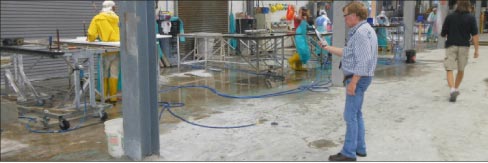 |
|
Above: Measuring shop noise levels with a sound level meter. |
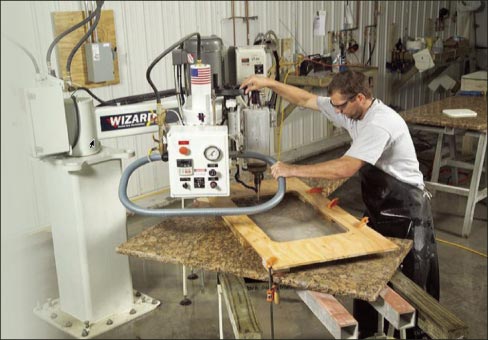 |
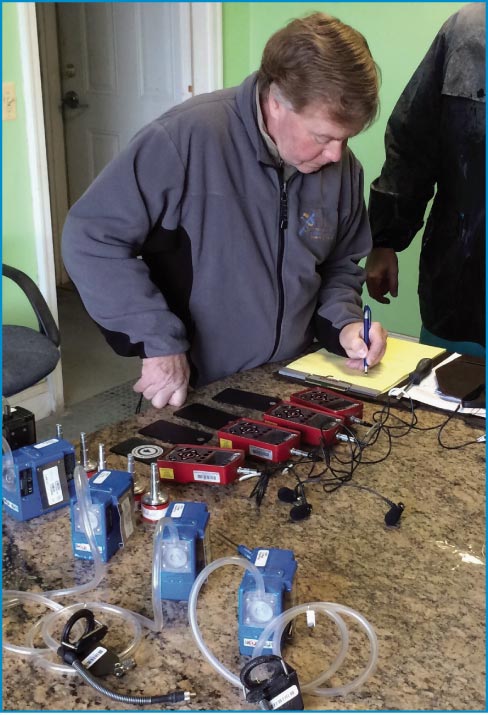 |
|
Above: Richardson calibrating noise dosimeters and air pumps prior to shop environment testing. |
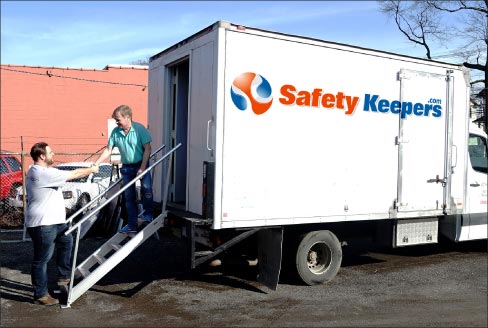 |
|
Above: Safety Keepers has the equipment to conduct onsite pulmonary testing, respirator mask fit testing and hearing testing. |
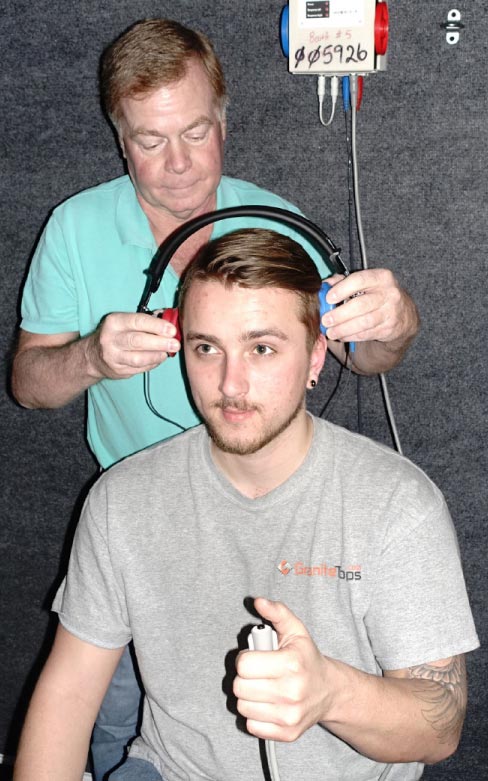 |
|
Above: An audiogram test provides an individual profile and baseline to monitor hearing loss in all employees. |
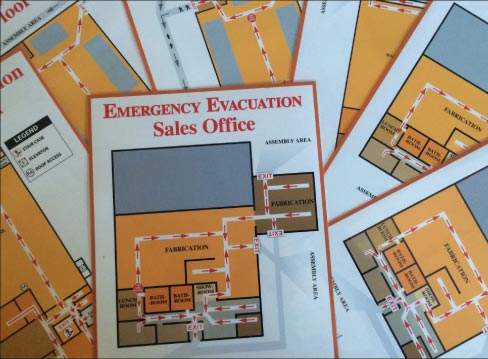 |
|
Establishing an emergency plan and training employees how to follow it is an essential part of maintaining OSHA compliance. |
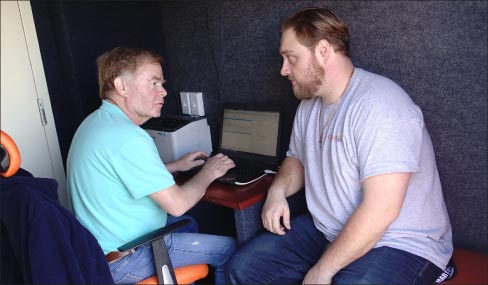 |
|
Safety Keepers provides test copies to each employee. |
Photos by Safety Keepers
Let’s face it, a building with tools and equipment is just a building, but a building with people is a company. If you’re a well-run company, many of those employees are going to dedicate their lives to the longterm success of your dream. Unfortunately, dreams can turn to nightmares in the blink of an eye.
I once asked a very wise man if he thought that knowledge was power. The man thought for a few seconds and replied, “Yes, but only if you know how to use it.”
Safety Keepers, located in Roselle, New Jersey, is a company built on the wisdom that it’s better to be safe than sorry, and trust me — with the new OSHA laws coming through the pipeline, if you don’t comply, sorry to say you’re going to pay a high price. That is, if you’re still allowed to keep the doors open.
Representing Safety Keepers is Pete Richardson. Pete proudly wears the title “Industrial Hygiene, Occupational Health and Safety Specialist.” We asked Pete to give us the basics on the services Safety Keepers offers.
Give us a brief explanation of what Safety Keepers offers the stone industry.
“Safety Keepers is a comprehensive occupational safety and health company. We do it all and are basically a one-stop shop for safety in the workplace. When the owner, Robert Deja, first visualized Safety Keepers, he saw it as a company that would serve the stone fabrication industry, and to a large extent this is the industry we serve.”
How comprehensive is your program?
“Our inspectors will come into a company and go through every part of it to identify all of their safety issues. We will then recommend corrective actions. If necessary, and if the company decides not to do the corrective actions themselves, we will do these for them. Additionally, we will look at the policies and procedures that are in place. Many companies have verbal safety procedures, but that doesn’t keep OSHA happy, because many times these procedures can be misinterpreted, so we will write safety programs that cover all of the hazards in a company. We’ll then train the employees in their native language and text so that they know what is expected of them. OSHA rules require that these rules and programs be translated in their language, if needed. So if they speak Spanish, Polish or any language, the information and training is clearly understood. We also provide comprehensive forklift training just like when you got your driver’s license. We have videos and classroom time to make sure that everyone understands the basics, and then give a written test. Those that pass then move on to driver training and a practical test. Then, and only then, if they’ve accomplished what they are expected to, they and the employer are given certification cards to prove to OSHA that they are trained. If there is any reason they are not successful, we will re-train them to make sure that they are successful, even if it takes two or three tries. We do the same for crane training. This training is mandatory if a facility has overhead cranes.”
What about the big one: silica?
“Yes, in the stone industry, silica is the big issue right now. So we will come in, look at the facility and its classification of jobs, identify who and what sections of the shop need to be tested, and monitor the airborne silica. We then send those results to an independent laboratory. What’s important about the laboratory we use is that it’s government certified, and when the results come back OSHA accepts the evaluation (whatever the result). We’ll then interpret these results and make recommendations.
“It may be engineering controls with things like ventilation or using more water in the fabrication process, or administrative controls such as rotating employees to decrease their exposure. But really, our goal is to avoid moving any employees to the personal protective equipment level such as a respirator. Under the new OSHA silica standards, as soon as any employees have to use personal protection, there is also going to be an extensive medical program required that is very costly to shops. So our goal is to engineer the environment so that it doesn’t require respirators. If for any reason it is physically impossible to reduce silica levels, we will provide the medical surveillance service using licensed occupational physicians. We’ll then provide the documentation, which remains in the company’s file for an OSHA inspection.”
What other hazards are addressed by Safety Keepers?
“The stone industry is a very noisy industry, so we also provide comprehensive hearing protection and hearing conservation services. We have a truck that is equipped with an office, a sound-proof booth and a state-of-the-art Benson audiometer. We are able to go out to any site and provide audio metric hearing testing and education. We also monitor employees for any changes or warning signs that show they are not properly protected, and then specify what type of protection they may need. In order to arrive at the conclusion that protection is needed, we also conduct noise studies in the environment. If needed, we’ll then make recommendations for changes in the tooling, the machinery or the environment. So basically, wherever your hazards are, we will address them. We are very good at identifying all hazards, and when we find them, we will put a program in place to deal with them. We’ll even do a chemical inventory of the facility and make sure that there are safety data sheets on file for all of the chemicals they use. Having these sheets is part of the Hazard Communication Program that OSHA has.”
If I were the owner of a fabrication company, why wouldn’t I just try and take care of things myself?
“One of the things we’ve learned is that safety is a complicated topic and most shop owners don’t have time for it. That’s where we come in. We are able to remain current on what the trends are and what OSHA is looking at. For instance: this year they are looking at forklifts and silica. So when we come in, we know what to look for as opposed to the owner trying to figure it out. This removes a lot of the burden from the owner.
“The second thing is that when OSHA is looking at any training documents of a company, if they see that the training has been done by an independent company, they know that shop owner is serious about safety and has not just printed up forms and had everybody sign it. They know that a company has come in and provided and documented the training. It’s that third party documentation, if you will, that carries a lot of weight with OSHA. We work with a lot of shops and with OSHA, and we know most of the inspectors by first name. I was just in one of their offices, and one of their guys said, ‘You’re here so much, you should have an office here.’ They are used to working with us, they know we do a good job, and they know they can trust us. So by bringing in an independent company, it brings credibility to a shop’s safety program because the owner had to pay for that service and is committed to safety.
“The third thing is that we have our finger on the pulse of safety at this point, whereas the shop owner might have to research what to do to be compliant with, let’s say, the new silica rule. We don’t have to do the research!
“We know what has to be done! We do it every day and we are not accidentally going to forget an important step, whereas the shop owner might miss in his or her research.
They may never have used a lab device to measure silica or hearing. We use them every day and our results are precise and can be verified.
“A fourth advantage is our comprehensive nature. If you’re trying to put resources together as a shop owner, you’re probably going to have to send your people out for hearing testing, and they are going to lose a half-day of work sitting in an office waiting for a test. We come to you and everything is done at your site. We only need your employee for ten minutes, not a half-day, so you are not trying to coordinate your work with you employee’s safety and health.
“These services are being delivered to your door, and your operation continues to run smoothly, and that’s important.”
When Safety Keepers takes on a fabrication company, is OSHA alerted that you are going there or alerted when you leave?
“OSHA is never notified by us. The only time that they are involved is when we have a shop approach us for our services because they have already been visited by OSHA, or are anticipating or already received a violation or fine. These cases are less than half of our clients, but are a significant number of shops. You know, the one frustrating part of this business is that safety is sometimes on the back burner until OSHA visits. It is so much easier to prevent the fine if we are onsite before OSHA ever comes by, as opposed to trying to clean up a mess. I will tell you that for those shops that have the unfortunate situation of being issued violations and fines, we will negotiate to reduce or eliminate them, and I will go to New York City, to Washington D.C. or anywhere to represent a client. I am not an attorney, but in the Federal Administrative Law Courts, you can be an appointed representative, and that’s how we function.
“So when a company has violations or fines, it’s not required that the company owner has to go and talk to OSHA. We have been fairly effective at getting significant reductions, and in some cases completely eliminating them.”
When one of your inspectors arrives, where do they begin and how long to they stay?
“Well, it all depends on what the shop owner wants. The owner can choose to take a package or (pick and choose from an) a la carte menu.
“He or she can call me and say, ‘I’m worried about the new silica rule, and I want to make sure my shop is doing what it is supposed to do to comply.’ In this case, it would be a different set of services from the, ‘Hey! Just come in and make my shop OSHA proof.’ So our stay can range anywhere from a few days to a few weeks. We are working with one shop right now that is both a wood and stone fabricator. In this case, we are there for more than just a few weeks because we are dealing with both wood and stone hazards. So it really depends on what you want us to do and how extensive your business is.
“When we are finished, you’ll know three things. First, you will know that your shop is safe. Second, you will know that if OSHA shows up at your door you can call us and we will be there in an hour. Third, and down the road, you will have access to us to make further recommendations. Another thing that I’d like to point out is that we not only deal with OSHA, we also deal with the Department of Environmental Protection (DEP).
So if the DEP comes in and says you’re discharging to ground water and you need to have corrective action, such as installing a water recycling system, we can do that, too, as well as represent you in any DEP proceeding. ”
It sounds like what you’re offering is so detailed and so comprehensive, that an owner, when Safety Keepers walks out of their door, might feel OSHA-proof. So should the owner then call OSHA and invite them to come and check them out, basically calling OHSA before they call on them?
“No, but I would suggest something along the same lines. Both New York and New Jersey offer voluntary consultation programs that are provided by their State Labor Department. You can invite them into your facility to review what you’ve done and to make any changes they feel relevant. I will be present for this, and if the state inspector says, ‘Well, we think you might have missed this,’ Safety Keepers will then take care of it. Then, and only then you can truly say you are OSHA-proof.”
You mentioned the new silica rule. There was a lot of discussion on this last year in the Slippery Rock. Has that rule taken affect yet for the stone industry?
“There are two silica compliance dates; one has already passed. The first was for people in the construction industry working with concrete and outdoor stone. The original date was June 23, 2017, and was then moved to September 23, 2017. The compliance date for fabrication shops is June 23 of this year.
“The rule basically says that the old acceptable exposure was way too high, and that it has been cut down to [ten percent] of its original number. That’s a lot stricter. The new rule also adds that you not only know the levels of silica, but also requires medical surveillances of your employees if you are over the limit of exposure. The old rule also said that you could simply fit a respirator for the person. Now, if you have to resort to a respirator, you also have to send your people for chest x-rays, respiratory tests, tuberculosis tests and extensive medical examinations. OSHA is doing a lot to get this new standard out there. So what I see is this: when OSHA walks into a shop after June 23 and says, ‘Let me see your silica results,’ and the shop cannot produce those results, they will be considered ‘Willful Violators,’ and the penalty for this is six figures.”
That’s pretty stiff penalty, and maybe catastrophic for some shops.
“Yes! Clearly, for smaller shops, this could mean their death. So if you’re slapped with a $125,000 fine, you’re talking about an awful lot of granite kitchens that would need to be produced to pay it off. So non-compliance of this rule will put people out of business. It really would be much better to spend under $10,000 dollars for compliance, rather than paying a huge fine for a willful violation.”
What can owners expect to pay for your services?
“Our prices are personalized to the size of the business and what we need to do. There are a lot of shops that have only four or five employees and have a good but not huge production volume. So what we need to do for them and their small production space is far less than a large company. Having said that, a great example is this; if you’ve got four employees in one small area, we might only need to take a few silica samples to find out everyone’s exposure. This lowers our costs as opposed to a shop that is spread out over three buildings. We typically ask for a 50 percent deposit to sign on to our services and the other 50 percent upon completion.”
Can some of these costs be offset by lower insurance costs, specifically Worker’s Compensation?
“Yes. We’ve had instances where a company received a reduction on their Worker’s Compensation surcharge because they engaged safety services. Companies have taken us on because they had a higher premium due to a surcharge for a bad safety record. These companies, even though they were considered a high liability, were given a surcharge reduction because they took Safety Keepers on and corrected their safety deficiencies.
“In addition, and generally speaking for most shops, using our services will cost you less than one violation. Obviously, there are many shops that go all year-long and are never visited by OSHA, but if you were visited and they found you in violation, our services, for sure, would have been the better bargain. The other thing, too, is that once you have our services and OSHA visits you, you’ll offer the inspector a cup of coffee and ask him to wait because we are calling our safety manager. You then call us, and we are there within an hour to meet the inspector. We’ll then take him on a tour of your facility and answer his questions.
“Generally, they’ll walk out happy with no violations or fines.”
If a shop owner or manager is interested in Safety Keepers, where do they begin?
“We have a website at www.safetykeepers.com. But I’m a believer that there is nothing like just picking up the phone and giving a call. So they can call me 24-hours a day, seven days a week at 551-204-7171. I always answer and an initial consultation is free of charge. If you’re interested in taking part in our services, we’ll be glad to take you on a client. If not, we’ll certainly give you some good advice and hope that you find another company that suits you. Robert and I feel that a safe company is profitable because you’re not dealing with lawsuits and insurance claims, and you’re a productive company because your employees are at work and not in the hospital or home recovering.”
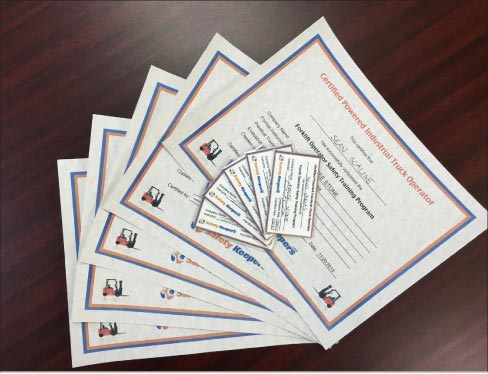 |
|
Safety Keepers provides company-specific forklift training completion certificates and license cards, good for three years. |
Before contacting you, what information does a prospective client need to have in hand?
“I need to know how large your shop is, how many people work there, what your square footage is, what equipment you have and how many shifts you operate. If you are a two or three shift operation, we would need to do sampling on all of those shifts and meet and work with all of your employees.”
Is there any advice you’d like to offer our readers?
“The only other thing I can suggest, is that if you were issued an OSHA violation, ACT FAST, because the clock is ticking and you only have 15 days to resolve a violation before the fine sticks. So if you call us and tell us you have a problem, we will send a letter of representation to OSHA and stop the clock until we can deal with it for you. That’s important, because a lot of shop owners don’t realize that if you let that 15-day period go by, you’re stuck with it! So stopping the clock is the first thing we’re interested in. We will help you deal with it by preparing a letter saying that we are contesting the violation and send it certified mail. The clock again stops at this point and gives us one to two months to deal with OSHA and the problem. After this time, if we are still having difficulty, I can always call the OSHRC and say that we need more time, and be granted a 30-day extension. But the most important thing to know is DON’T LET THAT 15-DAY PERIOD GO BY! Sure, after that, we can abate the condition, but you’ll still have to pay the fine. You’ve got to act fast!”
Thank you for your time, Pete Richardson! Clearly, knowledge is power, and Safety Keepers knows how to use it.
Safety Keepers owner, Robert Deja, has over twenty years experience in the stone industry. Pete Richardson teaches occupational health at the university level, and has been teaching for 27 years.